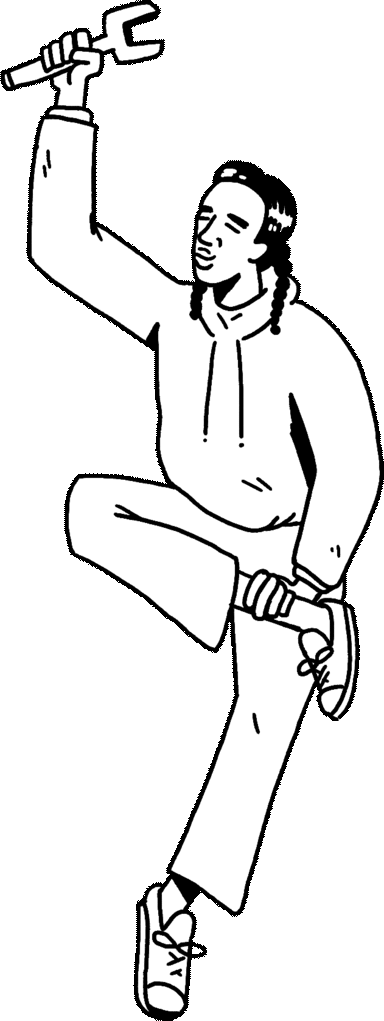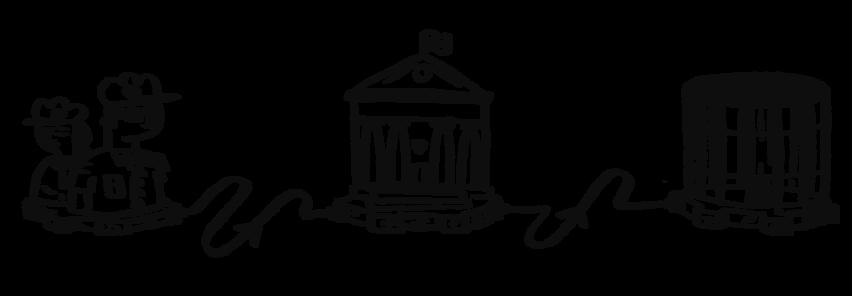
Beyond Criminal Courts
In the United States, policing, criminalization, and punishment operate as the default response to all forms of conflict, harm, and need. Criminal courts play a central role in this process, and create additional harms, separating families, caging people, depressing wages, inflicting long-lasting emotional distress, among other irreparable harms. As we work to defund police and prisons, we need to challenge and think beyond all carceral institutions, including criminal courts, in order to dismantle the entire prison industrial complex.
As we build a society that creates the conditions for us all to flourish, we must imagine ways to evaluate and adjudicate harm, violence, and abuse outside of systems of surveillance, policing, punishment, and exile.
Beyond Criminal Courts is a Digital Resource Hub for organizers, advocates and community members working together to build the organizing-power we need to defund, divest, and ultimately to dismantle criminal courts for good.
Use Beyond Criminal Courts' resources to:
- learn about criminal court processes, procedures, and actors,
- deepen abolitionist analysis and critique of criminal courts,
- envision other ways of investigating, evaluating and adjudicating harm, and
- organize to build power to defund and dismantle criminal courts.
We invite you to learn about the issue, imagine other life-giving ways of being in relationship with others, and act to dismantle oppressive systems while creating something new.
Wondering how to get started? Here are some ideas:
Why focus on criminal courts?
The majority of criminal court cases start with surveillance, policing, and criminalization in service of racial capitalism, cisheteropatriarchy, ableism, and border imperialism. Criminalization is a primary tool in establishing and maintaining these relations of power, and criminal law has always targeted people, communities, and behaviors in service of this goal. Instead of preventing or interrupting violence, criminalization has furthered the structural violence endemic to racial capitalism. As Ruth Wilson Gilmore says, “prisons are catchall solutions to social problems.”
Every day, criminal courts separate families, confine people to cages, depress wages, and inflict long-lasting emotional distress. For this reason, organizers must not only work to defund police and prisons. We have to dismantle the entire prison industrial complex, which includes courts, pre-trial supervision, probation, parole and diversion programs. At the same time, we need to dream and create new ways to prevent and interrupt violence, investigate and adjudicate conflict and harm, and invite accountability and transformation.
This means abolitionist movements need to focus on the operation, power and resources of criminal courts. Many already are. On this site, we’ll share what we know about criminal courts and why they can never deliver justice. Many procedural reforms promoted to eliminate discrimination and create more fairness in courts simply prop up a system that is designed to surveil, police, criminalize, and punish. Instead, we are more hopeful about campaigns to reduce funding, power and legitimacy, and ultimately dismantle criminal courts. Of course these are also inextricably linked to fights to divest from policing and punishment and invest in community safety.
As we build a society that creates the conditions for us all to flourish, we are imagining ways to evaluate and adjudicate harm, violence, and abuse outside of systems of surveillance, policing, punishment, and exile.
Criminal courts are just one part of the prison industrial complex.
They are situated in a vast web of public and private organizations, institutions, and individuals that accumulate power and profit from the expansion of systems of control and confinement. Like police and prisons, they consume millions of (mostly public) dollars a year that could be used to prevent, interrupt and heal from violence. To date, organizing and theorizing has primarily focused on other aspects of this web, specifically policing and imprisonment. This project seeks to intervene explicitly at the site of criminal courts, in ways that are connected to fights to defund and abolish police, criminalization, jails, prisons, ICE detention centers, surveillance, and more. Even as we focus on dismantling individual components, it is critical to keep the entire prison-industrial-complex in view.

